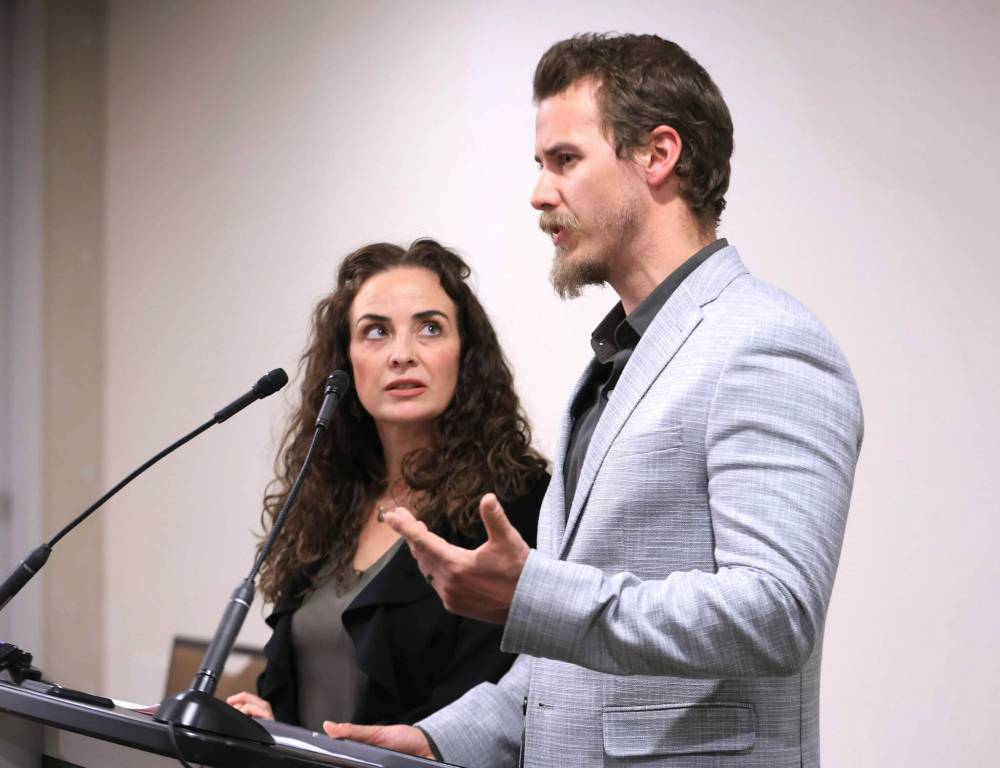‘We trusted the system to save her’
Manitoba woman’s family pushes for law to tell wait-list patients they won’t get life-saving treatment in recommended time
Advertisement
Read this article for free:
or
Already have an account? Log in here »
To continue reading, please subscribe:
Monthly Digital Subscription
$0 for the first 4 weeks*
- Enjoy unlimited reading on winnipegfreepress.com
- Read the E-Edition, our digital replica newspaper
- Access News Break, our award-winning app
- Play interactive puzzles
*No charge for 4 weeks then price increases to the regular rate of $19.95 plus GST every four weeks. Offer available to new and qualified returning subscribers only. Cancel any time.
Monthly Digital Subscription
$4.99/week*
- Enjoy unlimited reading on winnipegfreepress.com
- Read the E-Edition, our digital replica newspaper
- Access News Break, our award-winning app
- Play interactive puzzles
*Billed as $19.95 plus GST every four weeks. Cancel any time.
To continue reading, please subscribe:
Add Free Press access to your Brandon Sun subscription for only an additional
$1 for the first 4 weeks*
*Your next subscription payment will increase by $1.00 and you will be charged $16.99 plus GST for four weeks. After four weeks, your payment will increase to $23.99 plus GST every four weeks.
Read unlimited articles for free today:
or
Already have an account? Log in here »
Hey there, time traveller!
This article was published 12/03/2025 (300 days ago), so information in it may no longer be current.
The family of a Niverville grandmother who died while waiting for heart surgery is calling for changes that they hope will prevent similar deaths in Manitoba.
Debbie Fewster, 69, was told she required surgery within three weeks, but waited more than two months for a triple bypass before she died at home in October, her family said.
“My mom passed away before the surgery ever happened, and I can’t describe the shock, the anger and the grief,” her son Daniel Fewster said at a news conference Wednesday. “We trusted the system to save her, but it failed her and it failed us. It’s failing too many others.”

Fewster’s family joined a public policy think-tank, SecondStreet.org, to call for a law — Debbie’s Law — that would require health authorities to tell patients when they cannot provide life-saving treatment within the recommended period, such as the three-week timeline proposed by one specialist who examined Fewster.
“There is a desperate need for radical honesty in our health-care system,” said Colleen Dyck, Fewster’s daughter.
“If this saves one life, that’s huge for us. My mom would have wanted that,” Daniel Fewster said.
Regina-based SecondStreet.org, which describes itself as non-partisan, called on provinces, including Manitoba and Alberta, to track and disclose the number of patients who die on wait lists to help identify trends and where system improvements are needed.
After Fewster failed a heart stress test in August, a cardiac specialist told her she required surgery within three weeks, her son said.
Later that month, she was informed she had blockages in her arteries and required a triple bypass, her children told reporters.
She was given a prescription for medication and returned home.
“Up until then, they had moved fast. They acted like they knew her life was on the line, and we trusted they would keep that pace, but after that everything slowed down,” Daniel Fewster said.
He said Fewster’s brother had the same operation 20 years ago.
In September, a nurse told Fewster the surgery at St. Boniface Hospital likely wouldn’t happen that month because the facility was “catching up” after summer holidays, her son said.
“There is a desperate need for radical honesty in our health-care system.”–Colleen Dyck
He said his mother was still waiting for a surgery date when she died Oct. 13.
Fewster’s children expressed a desire for an explanation and apology. Dyck said her mother’s physicians did everything right by expediting her care, but the system failed her.
The median wait time for all heart surgeries was 12 days in December, according to the Manitoba government’s online dashboard. It is the point at which half of patients have had their treatment and the other half is still waiting.
The median wait was 10 days for emergent and urgent (priority 1) patients, who cannot be discharged from hospital before surgery.
For semi-urgent or priority 2 level patients (defined as those with significant heart problems who could deteriorate if they wait too long), the median wait was 27 days.
Priority 3, or elective, patients who were stable had a median wait of 113 days.
It was unclear if Fewster was told which priority level she was placed in.
A pan-Canadian benchmark specifies bypass surgery within two to 26 weeks, depending on how urgently care is needed.
In 2023, half of all patients in Manitoba waited 11 days before undergoing a bypass operation, while one in 10 waited 58 days, according to the Canadian Institute for Health Information.
Fewster, who battled breast cancer years ago, was settling into retirement and looking forward to spending time with her grandchildren at the time of her death.
“I do want to be very clear that here in Manitoba, if you’re someone who has an urgent or life-threatening health condition and you need life-saving care or critical intervention, you are going to get that care.”–Health Minister Uzoma Asagwara
She volunteered with organizations that provide aid to less fortunate people in other countries.
The Fewsters would have looked at options outside Manitoba, including costly private treatment, to get timely care, if they were told their mother faced a long wait time that was “unsafe,” said SecondStreet.org president Colin Craig.
Craig said the purpose of the proposed law is to increase transparency and potentially save lives.
“This law is not ideological. It’s just about being honest and up front with patients,” he said.
The NDP government pledged to hire more staff and improve cardiac care at St. Boniface Hospital when elected in October 2023.
Health Minister Uzoma Asagwara offered condolences to Fewster’s family while speaking to reporters at the legislature.
When someone dies while waiting for care, “that is a significant loss and not something that we want to see happening,” the minister said.
Asagwara said they are open to looking at the proposed law or other ways, including data-tracking that is done “responsibly,” to strengthen the system.
Protocols exist to prioritize patients who need life-saving treatment, Asagwara said.
“I do want to be very clear that here in Manitoba, if you’re someone who has an urgent or life-threatening health condition and you need life-saving care or critical intervention, you are going to get that care,” they said.

In February 2023, the Manitoba Liberal party said a freedom of information request showed the number of deaths on the cardiac wait list increased from three in the 2019-2020 fiscal year to six in 2021-2022.
Progressive Conservative health critic Kathleen Cook said she would support the proposed law and data-tracking.
“Public reporting helps identify trends, prioritize needs and allocate resources efficiently and, in cases like this one, it could even save lives,” the MLA for Roblin said.
Molly McCracken, acting spokesperson for the Manitoba Health Coalition, said the Canada Health Act guarantees universal, publicly funded health care to all Canadians.
“Unfortunately, due to insufficient funding, the system is falling short of this goal,” she wrote in an email. “The health-care system must be improved to ensure that all Manitobans receive quality, adequate care when they need it.”
chris.kitching@freepress.mb.ca

Chris Kitching is a general assignment reporter at the Free Press. He began his newspaper career in 2001, with stops in Winnipeg, Toronto and London, England, along the way. After returning to Winnipeg, he joined the Free Press in 2021, and now covers a little bit of everything for the newspaper. Read more about Chris.
Every piece of reporting Chris produces is reviewed by an editing team before it is posted online or published in print — part of the Free Press‘s tradition, since 1872, of producing reliable independent journalism. Read more about Free Press’s history and mandate, and learn how our newsroom operates.
Our newsroom depends on a growing audience of readers to power our journalism. If you are not a paid reader, please consider becoming a subscriber.
Our newsroom depends on its audience of readers to power our journalism. Thank you for your support.
History
Updated on Wednesday, March 12, 2025 7:35 PM CDT: Corrects references to SecondStreet.org
Updated on Wednesday, March 12, 2025 7:42 PM CDT: Corrects typo in headline
Updated on Thursday, March 13, 2025 1:37 PM CDT: Corrects typo







